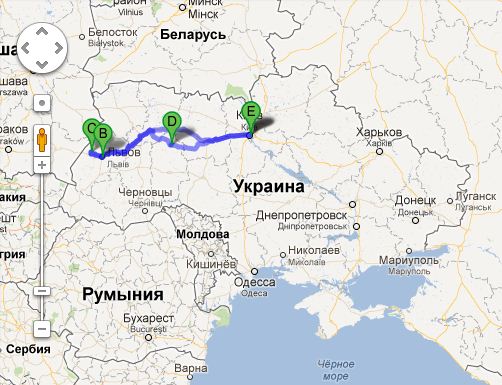Post-travel or rules of work on the road

Point A ✈ Point B; Placement, wagon 15, place 20; Time: 00:42; Speed: 70 km / h; Internet: cellular operator EDGE
Greetings, dear habrachititel! Autumn mood, night train, lack of talkative companions and a lot of free time during a business trip ... Why not write a post, I thought, and proceeded immediately. The topic has been spinning in my head for a long time, and is dictated by the very idea of writing something not in a cozy homely atmosphere, at a desk, but on the go, right on the road - reflections on our productivity on trips, working out of office, on business trips, on trips, on my way.
')
In fact, I am surprised when I read about how the arrival of “mobility” in work is associated only with the mass distribution of tablets and / or the appearance of the next version of the mobile operating system. I remember well how I started using the first PDA (then Palm). The most "cool and tricked" among the students of our faculty was the Motorola C350 with (think only!) Color screen. Then the era of Siemens came, Nokia fans kept themselves apart, and Windows Mobile smartphones, like a phoenix bird, went on sale right with the new versions - from WM 2002 to WM 5.0 and WM 6.X a long time passed. In my opinion, their main “scourge” and disadvantage was insufficient autonomy (not by itself, but when using GPRS / EDGE / 3G), although thanks to it, perhaps you need to say the program part.
Surprisingly, many similar things were in the development of various mobile operating systems. This is “hereditarily” terrible work with office documents on mobile devices, and combating the encodings of incoming e-mails, and walking around with the choice of a client for ICQ / Jabber, and, finally, the development of software interfaces and the convenience of using them, starting with wins capacitive screens over resistive, ending with the development of the ARM architecture and a significant increase in battery life.
The most curious thing is that the mobile Internet (namely, its accessibility for everyday use) has become an indispensable tool for studying and working even before the partial solution of problems with autonomy. Like many others, I was a fan of devices with a hardware keyboard, and after the appearance of 3G in the city, my WM communicator kept up to 2 hours of active surfing and / or IM correspondence, after which it was discharged to 0%. After such an experience, indulgently forgive your budget Android-smartphone requests to charge them by 18 o'clock. One summer I tried to charge my zoo with gadgets with solar charging ... Alas, while surfing and recharging, I only achieved charge support at a certain level and sunburn. :) In the long road, a spare or external battery will not be superfluous.
Item B ✈ Morning Station; Time: 05:55; Speed: 1 cup of coffee / 15 minutes; Internet: 3G from cellular operator

But with laptops, the situation is different. I don’t know what kind of future awaits us after the release of Windows 8 (and even more so its ARM version with the Modern UI), but here Windows 7 era laptops fully stand with all 12 feet on the tortoise shell of autonomy - this is the great coming of netbooks, Atom and its analogs, integrated video cards, etc. Ultrabooks are now taking over the baton, but can they work as long as low-powered long-livers of eeePC? This is where the second question arises: do they have to work N-hours? Here, for example, in trains it is increasingly possible to find not just visibility, but real, constantly working sockets. It seems to me that the technology of not “long work”, but fast device charging, is unfairly pushed into the background. It is actually more important on the way - to stop at a cafe / hotel / hostel and charge your gadgets before the next point of the route. And instead of the much-desired unification of chargers (which, it seems to me, you should not wait in the near future - it’s enough to look at the variety of charging for electric cars, which at least once or twice, but everyone has their own charging). I can advise to take a tee with me. Alas, in our reality, the standard “one outlet - one room” standard is strictly maintained in the rest rooms.
Item B ✈ Item C; PAZ-672 bus; Time: 07:40; Speed: 55 km / h; Internet: cellular operator EDGE
The biggest breakthrough in work on the go for me personally was the Gmail service and other working tools from Google. Starting from Gtalk (I’m ready to name its most noticeable advantages: the entire message history is written / saved regardless of the device, multiple sessions started writing on the phone, finished the thought in the browser, as well as fast work) and ending with Google Docs. Browsers are getting faster, working with documents online has finally ceased to resemble the struggle of an invincible force with an insurmountable obstacle. The only thing that upsets is the imminent refusal to support the outdated ".doc" in favor of ".docx" - for the present, the legacy of Office 1997-2003 is more than common.
I will give second place in the nomination “Mobile Assistant of the Year” to data synchronization services - Dropbox and others. What is especially nice: their mobile versions take into account the realities of the modern mobile Internet and can selectively download data from the cloud. I once tried using Evernote as a collaboration tool, but the experience was unsuccessful. Perhaps this is just a private example. All other alternative services (including GoogleDrive) seemed less convenient to me. In any case, taking documents with a flash drive has long been practically unnecessary. Even small external data carriers themselves are under threat - they are being supplanted by impressive amounts of internal memory in devices and fast interfaces for transferring USB 3.0 / Thunderbolt data, not to mention external solid-state drives, the price of which is rapidly falling. I replaced my DVD drive in a laptop with a second SSD.
Item B ♬ Second floor cafe; Speed: 0.5 liters of beer / hour; Time: 20:32; Internet: free Wi-Fi
Often you can meet opponents of covers and films on the screen. The experience of long trips has shown that my attachment to additional shells gives its results. I still remember the whole range of emotions when a freshly bought smartphone with the sound of "fvyu" and a terrible crash landed from the third shelf of the train on the hard floor of the car. With a mournful expression on my face, I went downstairs, and - oh, a miracle - only the hard case suffered, and the film was scratched. On the road, anything can happen, and I prefer to erase fingerprints on the screen from an external matte film (from the moment I know which glue to each new gadget) without worrying about the safety of the oleophobic display coating (which is not always applied). Separately, I will share thoughts about "private" and "mirror" films - fear them like fire. Firstly, in order to see at least something, it is necessary to significantly increase the brightness of the screen, and secondly, it is difficult for me to imagine why lowering the viewing angles as opposed to the matrix with wide angles set by the manufacturer, not to mention the natural color reproduction. I will attribute the matte film to the lesser of the evils - the “jiggle” of the pixels, of course, is noticeable, but the anti-reflectivity and the ability to see something in the bright sun are worth a lot.
Item B ✈ Item D; Waiting hall; Time: 01:14; Speed: 0 km / h; Internet: not available
Once, in order to gain access to the Internet, I needed to use the Nokia 6822i, infrared and a laptop with a built-in infrared port (without USB and other civilization benefits) running Windows 98SE (Pentium 150Mhz processor, 36Mb of RAM, and, no, this is not typo). The sight of Habrahabr loading for 25 minutes (via GPRS / IR) plunged me into a deep frustration, which, however, intensified after the fall of Mozilla (didn’t have enough RAM?) And the phone that went out (completely discharged). And although my current phone can work as an access point (Wi-Fi, Bluetooth - most smartphones now do), I still take with me a “modem keychain”. More than once he rescued me, it would seem, in unlikely situations. For example, at the opening for Euro-2012 of the stadium NSK “Olympic” in the press sector, there were three Wi-Fi access points, but the Internet showed no signs of life. However, as the 3G network in the district. Is it a joke, thousands of photos on Instagram every second? :) Saved the situation good old EDGE and laptop. Backup link is important not only in the data center.
Item D ✈ Waiting Room; Time: 04:59; Temperature: + 3 ° C; Battery charge: 17%
Every time when praising aluminum and metal cases, I suggest touching them in winter. :) Alas, not everyone remembers that heat transfer and heat dissipation is a double-edged sword, not to mention the dangers of cold for batteries. So during the winter, you have to take extra care to keep all the gadgets warm, which is not always possible. I remember how, after a long working conversation in the cold, the smartphone froze from the inside ... It’s hard to convey your emotions when you look at the frost patterns under the screen. :) But I was lucky and that particular instance served me faithfully right up until spring. To avoid repeating this experience with the tablet and laptops so far succeeds.
Point D ✈ Point E; Not far from the station; Time: 13:52; Speed: 5 km / h; Battery charge: 2%

What else could you remember? About data security (for example, remote control / erasure systems) and the importance of “unlocking” on other devices. Such a seemingly obvious thing often eludes attention. Once at a conference, out of curiosity, I installed the Folding @ Home client on my presentation computer and forgot to delete it. Two years later, I received an e-mail and found that I had made a significant contribution to the decoding of proteins. :) Of course, the example has little to do with data security on trips, but it clearly demonstrates that it is better not to leave such tails behind you.
I am finally going home to civilization and to a
If you have had an adventure from which you learned the useful experience of the “rules of work on the road”, or your experience with traveling with gadgets is completely different from mine - share them in the comments to this topic.
Source: https://habr.com/ru/post/155723/
All Articles